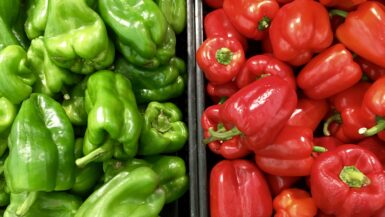In today’s fast-paced world, many people rely on fast food and takeout for their daily meals. However, these convenient options are often high in calories, unhealthy fats, and sugar. As a result, more and more people are realizing the importance of cooking at home for a healthy diet. Cooking at home not only allows you to control the ingredients and portion sizes of your meals but also helps you develop a deeper appreciation for food and the cooking process. In this article, we will explore the benefits of cooking at home for a healthy diet and provide tips for getting started in the kitchen.
The Benefits of Cooking at Home for Your Health
Cooking at home is not only a fun and enjoyable activity, but it also comes with a host of health benefits. One of the main benefits of cooking at home is that you have complete control over the ingredients that go into your meals. This means that you can choose to use fresh and whole ingredients, which are packed with essential nutrients that your body needs to function optimally.
When you cook at home, you can also control the portion sizes of your meals, which is important for weight management. Restaurant meals are often loaded with excess calories, unhealthy fats, and sodium, which can contribute to weight gain and other health problems. By cooking at home, you can ensure that you are eating a balanced and nutritious meal that is tailored to your specific dietary needs.
Another benefit of cooking at home is that it can help you develop a healthier relationship with food. When you cook your own meals, you are more likely to appreciate the effort that goes into making them and savor the flavors and textures of your dishes. This can help you become more mindful of your eating habits and reduce the likelihood of overeating or mindless snacking.
Overall, cooking at home is a simple yet effective way to improve your health and wellbeing. By taking control of your diet and making conscious choices about what you eat, you can enjoy a healthier and more fulfilling lifestyle.
How Cooking at Home Can Help You Save Money and Eat Healthier
Eating out at restaurants or ordering takeout can quickly add up and become expensive. Cooking at home is not only a more affordable option, but it also allows you to make healthier choices and control the quality of your ingredients. Here are some ways cooking at home can help you save money and eat healthier:
1. Buy ingredients in bulk
Buying ingredients in bulk can help you save money in the long run. Look for deals on non-perishable items like grains, beans, and nuts, which can be stored in your pantry for months. You can also buy fresh produce in bulk when they are in season and freeze them for later use.
2. Plan your meals
Meal planning is an effective way to save money and reduce food waste. Before you go grocery shopping, plan out your meals for the week and make a list of the ingredients you need. This will help you avoid buying unnecessary items and ensure that you have everything you need to make your meals.
3. Cook in batches
Cooking in batches can help you save time and money. You can make a large batch of a particular dish and portion it out for the week. This is especially helpful for busy weekdays when you don’t have time to cook every day.
4. Use leftovers
Don’t let your leftovers go to waste! Use them to make new dishes or repurpose them for another meal. For example, leftover grilled chicken can be used to make a salad or sandwich for lunch the next day.
In addition to saving money, cooking at home can also help you eat healthier. When you cook at home, you can control the amount of salt, sugar, and unhealthy fats in your meals. You can also choose to use fresh and whole ingredients, which are packed with essential nutrients that your body needs to function optimally.
In conclusion, cooking at home is a cost-effective and healthy way to eat. By planning your meals, buying ingredients in bulk, cooking in batches, and using leftovers, you can save money and reduce food waste. Additionally, cooking at home allows you to make healthier choices and control the quality of your ingredients.
The Impact of Processed Foods on Your Health and Why Cooking at Home is a Better Option
Processed foods are often high in calories, unhealthy fats, sugar, and sodium, which can lead to a host of health problems such as obesity, heart disease, and diabetes. These foods are also often lacking in essential nutrients that your body needs to function optimally. Here are some reasons why cooking at home is a better option than relying on processed foods:
1. You can control the quality of your ingredients
When you cook at home, you have complete control over the quality of your ingredients. You can choose to use fresh and whole ingredients, which are packed with essential nutrients that your body needs to function optimally. This can help you avoid the harmful additives and preservatives found in processed foods.
2. You can reduce your intake of unhealthy fats, sugar, and sodium
Processed foods are often high in unhealthy fats, sugar, and sodium, which can contribute to weight gain and other health problems. By cooking at home, you can control the amount of these ingredients in your meals and make healthier choices.
3. You can customize your meals to your specific dietary needs
When you cook at home, you can tailor your meals to your specific dietary needs. For example, if you have a food allergy or intolerance, you can avoid those ingredients and make substitutions as needed. This can help you avoid the harmful effects of consuming foods that your body cannot tolerate.
4. You can save money in the long run
While processed foods may seem cheaper in the short term, they can actually end up costing you more in the long run. By cooking at home, you can buy ingredients in bulk, plan your meals, and reduce food waste, all of which can help you save money.
In conclusion, relying on processed foods can have a negative impact on your health. By cooking at home, you can control the quality of your ingredients, reduce your intake of unhealthy fats, sugar, and sodium, customize your meals to your specific dietary needs, and save money in the long run. So, put down that frozen dinner and start cooking at home for a healthier and more fulfilling lifestyle.
Tips for Meal Planning and Prepping to Make Cooking at Home Easier
Meal planning and prepping can be a game-changer when it comes to cooking at home. By taking the time to plan and prepare your meals in advance, you can save time and reduce stress during the week. Here are some tips for meal planning and prepping to make cooking at home easier:
1. Plan your meals in advance
Before you go grocery shopping, take some time to plan out your meals for the week. This will help you avoid buying unnecessary items and ensure that you have everything you need to make your meals. You can also use this opportunity to incorporate more fruits, vegetables, and whole grains into your diet.
2. Make a grocery list
Once you have planned out your meals, make a grocery list of all the ingredients you need. This will help you avoid forgetting anything and make your grocery shopping more efficient.
3. Prep ingredients in advance
Take some time on the weekends to prep ingredients in advance. For example, you can chop vegetables, cook grains, and marinate proteins. This will help you save time during the week and make cooking at home more manageable.
4. Cook in batches
Cooking in batches is an effective way to save time and reduce stress during the week. You can make a large batch of a particular dish and portion it out for the week. This is especially helpful for busy weekdays when you don’t have time to cook every day.
5. Invest in quality storage containers
Invest in quality storage containers to store your prepped ingredients and meals. This will help keep your food fresh and make it easier to transport your meals to work or school.
Incorporating meal planning and prepping into your routine can help make cooking at home more manageable and enjoyable. By taking the time to plan and prepare your meals in advance, you can save time, reduce stress, and ensure that you are eating a healthy and balanced diet.
Remember, cooking at home is not only a healthier option but also a more affordable one. By following these tips, you can make cooking at home a fun and rewarding experience that promotes a healthy lifestyle.
How to Make Cooking at Home a Fun and Enjoyable Experience
Cooking at home doesn’t have to be a chore. In fact, it can be a fun and enjoyable experience that promotes a healthy lifestyle. Here are some tips to help make cooking at home a fun and enjoyable experience:
1. Get creative with your recipes
Don’t be afraid to get creative with your recipes. Experiment with new ingredients, flavors, and cooking techniques. You can also try recreating your favorite restaurant dishes at home.
2. Make it a social activity
Cooking at home can be a great way to spend time with family and friends. Invite them over to cook together or host a dinner party. This can help make cooking at home a fun and social activity.
3. Listen to music or a podcast
Listening to music or a podcast while cooking can help make the time go by faster and create a more enjoyable atmosphere in the kitchen.
4. Get the whole family involved
Cooking at home can be a great way to bond with your family. Get your kids involved in the cooking process by having them help with tasks such as measuring ingredients, stirring, or chopping vegetables.
5. Learn new skills
Learning new cooking skills can help make cooking at home more enjoyable. Take a cooking class or watch cooking tutorials online to learn new techniques.
6. Treat yourself
Treat yourself to high-quality ingredients or kitchen tools to make cooking at home more enjoyable. For example, invest in a good quality knife or buy fresh herbs to add more flavor to your dishes.
Incorporating these tips into your cooking routine can help make cooking at home a fun and enjoyable experience. By getting creative with your recipes, making it a social activity, listening to music or a podcast, getting the whole family involved, learning new skills, and treating yourself, you can make cooking at home a rewarding and fulfilling experience.
The Role of Cooking at Home in Promoting Family Bonding and Social Connections
Cooking at home can be a great way to bring families together and create social connections. When family members cook together, it allows for quality time spent together while also creating a sense of teamwork and collaboration. This can lead to stronger relationships and a more positive family dynamic.
Additionally, cooking at home can also be a great way to connect with friends and neighbors. Hosting a dinner party or potluck can bring people together and create a sense of community. It also allows for the opportunity to share recipes and cooking tips, which can be a fun and educational experience for everyone involved.
In today’s fast-paced world, it can be easy to prioritize convenience over quality time spent with loved ones. However, taking the time to cook at home and share meals with family and friends can have a positive impact on both physical and mental health.
Some tips for promoting family bonding and social connections through cooking at home include:
- Involve everyone in the meal planning process
- Assign tasks to each family member to encourage teamwork
- Try new recipes together to keep things interesting
- Host dinner parties or potlucks to bring people together
- Share recipes and cooking tips with friends and neighbors
- Make an effort to sit down and enjoy meals together without distractions
By prioritizing cooking at home and making it a fun and enjoyable experience for everyone involved, families and communities can reap the benefits of stronger relationships and a healthier lifestyle.
The Importance of Using Fresh and Whole Ingredients in Your Home-Cooked Meals
Cooking at home allows you to have control over the ingredients that go into your meals. By using fresh and whole ingredients, you can ensure that your meals are not only healthier but also more flavorful.
Fresh ingredients, such as fruits and vegetables, are packed with nutrients and are essential for maintaining a healthy diet. They are also free from preservatives and additives, which can have negative effects on your health. Whole ingredients, such as whole grains and lean proteins, are also important for a balanced diet as they provide essential nutrients and can help you feel fuller for longer periods of time.
When cooking with fresh and whole ingredients, it is important to pay attention to portion sizes and avoid adding excessive amounts of oils or fats. This can help to maintain a healthy diet and prevent weight gain.
Some tips for using fresh and whole ingredients in your home-cooked meals include:
- Shop for fresh produce at your local farmer’s market or grocery store
- Choose whole grains, such as brown rice and quinoa, instead of refined grains
- Opt for lean proteins, such as chicken, fish, and tofu
- Avoid processed foods and ingredients with added sugars and unhealthy fats
- Experiment with new herbs and spices to add flavor to your meals
By using fresh and whole ingredients in your home-cooked meals, you can ensure that you are providing your body with the nutrients it needs to function properly. Additionally, cooking with fresh ingredients can be a fun and creative experience, allowing you to experiment with new flavors and dishes.
How to Incorporate More Fruits and Vegetables into Your Home-Cooked Meals
Fruits and vegetables are essential for a healthy diet as they provide essential vitamins, minerals, and fiber. However, many people struggle to incorporate enough fruits and vegetables into their diet. Cooking at home provides the perfect opportunity to experiment with new ways of incorporating fruits and vegetables into your meals.
One way to incorporate more fruits and vegetables into your home-cooked meals is by adding them to dishes such as stir-fries, soups, and stews. This allows you to easily increase your intake of vegetables without sacrificing flavor. Additionally, fruits can be added to breakfast dishes such as oatmeal or smoothies, or as a healthy dessert option.
Another way to incorporate more fruits and vegetables into your home-cooked meals is by trying new recipes that feature them as the main ingredient. For example, roasted vegetable dishes or fruit salads can be a delicious and healthy addition to any meal.
Some tips for incorporating more fruits and vegetables into your home-cooked meals include:
- Plan your meals around fruits and vegetables
- Try new recipes that feature fruits and vegetables as the main ingredient
- Add vegetables to dishes such as stir-fries, soups, and stews
- Include fruits in breakfast dishes and as a healthy dessert option
- Experiment with different cooking methods, such as roasting or grilling, to add variety to your meals
By incorporating more fruits and vegetables into your home-cooked meals, you can ensure that you are getting the essential nutrients your body needs to function properly. Additionally, cooking with fruits and vegetables can be a fun and creative experience, allowing you to experiment with new flavors and dishes.
The Benefits of Cooking with Herbs and Spices for Flavor and Health
Cooking with herbs and spices is a great way to add flavor to your meals without the need for excess salt, sugar, or unhealthy fats. Additionally, many herbs and spices have health benefits and can help to improve digestion, reduce inflammation, and boost the immune system.
Herbs, such as basil, parsley, and cilantro, are packed with antioxidants and can help to reduce inflammation in the body. Spices, such as turmeric, ginger, and cinnamon, have anti-inflammatory properties and can help to improve digestion and regulate blood sugar levels.
Cooking with herbs and spices can also help to reduce the amount of added salt and sugar in your meals. This is important as excessive consumption of salt and sugar can lead to health problems such as high blood pressure and diabetes.
Some tips for cooking with herbs and spices include:
- Experiment with different herbs and spices to find flavors you enjoy
- Use fresh herbs whenever possible for optimal flavor and health benefits
- Try making your own spice blends to control the amount of salt and sugar in your meals
- Add herbs and spices to marinades and dressings for extra flavor
- Use herbs and spices to season vegetables for a healthy and flavorful side dish
By cooking with herbs and spices, you can add delicious flavor to your meals while also reaping the health benefits they provide. Additionally, using herbs and spices can be a fun and creative way to experiment with new flavors and dishes.





Leave a reply